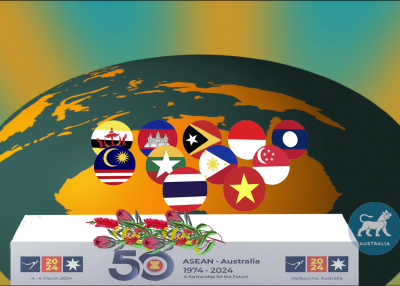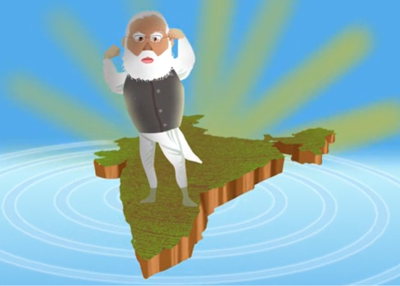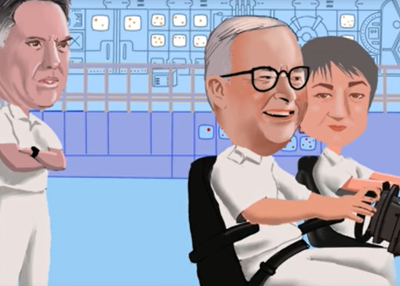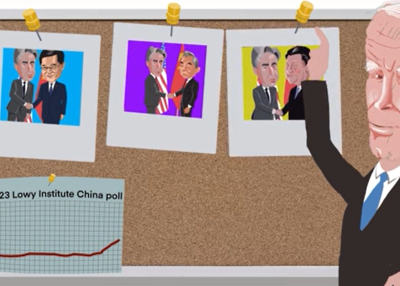Briefing MONTHLY #54 | September 2022
Asia reopens | Democracy pressures | China relations | Asian royalty | Timor’s fiscal cliff
Animation by Rocco Fazzari
THE BALI OPTION
Home Affairs Minister Clare O’Neil probably didn’t have Asia in mind when she told the Jobs and Skills Summit in early September that Australia was no longer a country of choice for skilled immigrants.
But in the weeks surrounding the summit discussions about restarting Australia’s skilled migration program Singapore, Thailand and even Indonesia have made their pitch for the same digital nomads that Australia, in part, wants to attract.
And as this new competition for digital workers emerges, Asian countries have also stepped up their pitch for post-pandemic tourists led by Japan’s reopening on October 11 as it touts a very cheap currency ahead of the winter ski season.
Singapore is introducing a new five-year visa for high-earning foreign nationals allowing them to work at multiple companies despite popular discontent amongst Singapore citizens with the city state’s high expatriate population. The new Overseas Networks & Expertise (ONE) Pass will allow expatriates earning monthly salaries of more than S$30,000 Singapore dollars and compares with an existing visa of two to three years which is tied to an existing job. Manpower Minister Tan See Leng makes no secret of the battle for people under way saying: “As a country with little or no natural resources, talent is our only resource and talent acquisition is an offensive strategy for us.”
Meanwhile Thailand is aiming to attract one million wealthy or talented foreigner residents over the next five years with a ten-year Long Term Resident visa. And Indonesia appears to reversing its COVID-era crackdown on foreigners exploiting tourist visas to stay in Bali with Tourism Minister Sandiaga Uno now encouraging digital workers to stay for up to six months under their tourist visa. “I am increasingly convinced the number of foreign tourists who are interested in staying in Indonesia will increase and will automatically have an impact on economic revival,” he said.
Japanese Prime Minister Fumio Kishida used his visit to New York for the United Nations General Assembly as a high-profile platform to announce Japan’s renewed acceptance of visa free entry for short-term travellers. But Japan is still requiring tourists to have three vaccine doses or a negative PCR test before arriving. Japan had 169,800 visitors in August under tighter family and organised tour rules which was down 93 per cent from the same month in 2019 when it received 30 million tourists in a year.
South Korea, Taiwan and Hong Kong have also announced more liberal rules for tourists. But Asia’s pandemic tourism rebound is set to be slower than what has been seen in Europe because of the continuing constraints on Chinese travellers.

Source: ADB Outlook Update
- The Jobs Summit may have been driven by domestic economic needs, but it also had some little appreciated or reported implications for Australia’s foreign policy, international business, and aid policy.
NEIGHBOURHOOD WATCH
JAPAN: GREY-HAIRED DEMOCRACY
For a man used to parsing the arcane details of monetary policy, former Bank of Japan governor Masaaki Shirakawa has a cut though way of accounting for Japan’s demographic crunch … and his own role in it. He used the keynote speech to the Australian National University’s Japan Update to declare that he contributed to his country’s fertility crisis when he was a young staffer at the central bank by working from 9am to 11pm. “Japanese society is not friendly enough for young couples who want to have babies,” he conceded with remarkable frankness for a once top-level economic policy maker.
Shirakawa’s reiterated the key theme of his recent book about how global central bankers have misunderstood Japan’s pioneering of extraordinary monetary policy easing was driven by its poor demographics and the collapse of its 1980s bubble. And so, he argues that those other central bankers have followed the Japanese monetary model into creating the conditions for the current global inflation surge. Instead, he says other advanced countries should be focusing on the bigger picture in Japan which is that they will possibly eventually face the same daunting population challenges.
Shirakawa describes Japan as a “grey-haired democracy” where it takes increasingly longer time to get a meaningful consensus as technology and globalisation affect people differently, declining population varies across the country and inequality widens despite Japan still having even wealth distribution by international standards. He says: “In order to create a higher birth rate, the government has to increase expenditure on newly born babies but in a grey-haired democracy, expenditure on the elderly such as welfare and medical services are preferred.”
PHILIPPINES REDUX
In the spirit of last month’s special focus on the Philippines coming out of the pandemic under a new president, a couple of follow-ups to two of the key themes.
Diplomacy: President Ferdinand Marcos Jr has raised the prospect of new talks with China over joint oil and gas exploration in the South China Sea to expand and diversify its sources of energy. He told Bloomberg TV the Philippines was seeking a compromise with China that took account of the fact that the two countries could not agree on which nation’s law would prevail in the maritime territory. He said: “There have been examples around the region where there have been similar differing views on exclusive economic zones and baselines, where they have managed to find a way to have joint explorations,” he said.
Migration: Stepping up its campaign to promote the skills of its people to fill post-pandemic labour market gaps in countries including Australia, the Philippines Department of Trade and Industry has released a study by Australian company, Fingerprint for Success analysing the skills of Filipino workers. It says the key traits that distinguish the working culture in the Philippines are: having a theoretical approach and understanding the rationale behind tasks; making decisions based on what can be seen and observed; focusing on what is present and practically relevant; improvement over time; and consistently checking for accuracy and continuous performance. Australian trade representative Alma Argayoso says the culture map provides entrepreneurs and investors with a tool to better understand new opportunities for employing a Filipino workforce.
SAVING THE KINGS
Britain has exited Asia three times in the past century: after the fall of Singapore in 1942; after the Suez crisis in 1956; and on joining the European Community in 1973. But old ties run deep.
Four regional countries join Australia in recognising the British monarch as their head of state: New Zealand; Papua New Guinea; the Solomon Islands; and Tuvulu. And a further eight are part of the 56-member Commonwealth: Bangladesh, Brunei, India, Malaysia, the Maldives, Pakistan, Singapore and Sri Lanka.
Opinion on the impact of the Queen’s death has generally been muted in broader Asia but a bit more divided in the country which arguably matters most – India, which was once the heart of the British empire. In this Deutsche Welle assessment, international relations commentator Amitabh Mattoo argues that the Commonwealth remains a valuable part of the global diplomatic architecture due to its diversity. But in this New York Times assessment, historian Sucheta Mahajan says Indians “are not treating it (the Queen’s death) like the death of an important world leader.”
Nevertheless, six Asians are likely to have followed the debate about the future of the British monarchy more closely than most: Emperor Naruhito, of Japan; King Vajiralongkorn (Rama X), of Thailand; Yang Di-Pertuan Agong Abdullah, of Pahang/Malaysia; Sultan Hassanal Bolkiah, of Brunei Darussalam; King Norodom Sihamoni, of Cambodia; and King Jigme Khesar Namgyel Wangchuck, of Bhutan. The Asian region’s last remaining royal houses have often drawn at least some ceremonial inspiration from the enduring British model over the years and so its future has some relevance for their future.
Southeast Asians are mostly happy with their remaining royals but tensions can arise during successions, according to this piece from The Economist.
ASIAN NATION
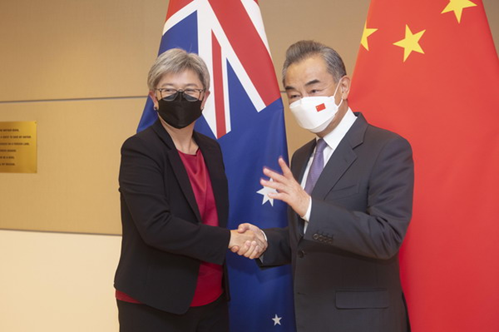
Penny Wong and Wang Yi at the United Nations
CHINA RELATIONS
China’s Foreign Minister Wang Yi appears to have stepped up his country’s efforts to improve bilateral relations before this year’s 50th anniversary saying Beijing wanted to work with Australia to resolve differences.
Speaking after his meeting with Foreign Minister Penny Wong at the United Nations General Assembly in New York, Wang said China welcomed Australia’s reaffirmation of its “one-China policy” relating to Taiwan, which Beijing considers part of its territory.
“After half a century of storms, the relationship between the two countries should become more mature and stable, resilient and without surprises,” Wang said in comments published by the Chinese foreign ministry.
“China is willing to work with the Australian side to... properly resolve differences and promote the healthy and stable development of bilateral relations.”
Earlier Senator Wong said the 40-minute meeting, their second in three months, was constructive, but they were a long way from regaining the relationship they once shared.
While the manoeuvring between the diplomats might be delphic, the roleplay between the strategic commentators is certainly not.
Former Australian Strategic Policy Institute director Peter Jennings says: “It’s a mystery to me why many in Australia persist in believing Wang’s flatteries or talk about “win-win co-operation” holds out any real prospect for change in relations. To do so is to confuse diplomacy for strategy.”
But former ambassador to China Geoff Raby says: “If the will is there to move forward, it can be done. Diplomacy is the art of solving difficult problems without giving way on national interests.”
REBUILDING THAIS
Thailand is the latest focus of bilateral relationship renewal after the pandemic with a second track bilateral diplomatic dialogue, a revamped Australia Thailand Business Council (ATBC) and a planned visit to Thailand by Foreign Minister Penny Wong.
The dialogue, at the Australian National University and the Lowy Institute in association with the Asia Foundation, focused on potential new areas for cooperation in the new regional security environment drawing on the countries’ different experiences with China. For many of the participants in the Thai delegation, led by Senator Kitti Wasinondh, it was their first trip out of the country since the pandemic hit.
Meanwhile ATBC national president Douglas Blunt says the group is rejuvenating after the COVID border closures and recently gave a business review to the new Australian Ambassador to Thailand Angela McDonald.
Apart from Blunt, the new national leadership team is vice president Dale Foody (South Australia); Glen Robinson (NSW); Daniel Weeks (Queensland); Chris Moor (WA); Peter Siripol (Canberra); and Charn Saralertsophon (Bangkok).
A dialogue group member and journalist Kavi Chongkittavorn has raised the prospect in this Bangkok Post column of greater cooperation between Australia and Thailand on the Myanmar crisis based on past joint work resolving conflicts in Cambodia and Timor Leste.
TRADING PLACES
India is on the cusp of becoming Asia’s largest country (by population) and is the third largest economy while Timor Leste remains amongst its smallest by population and is the smallest economy. So, it was interesting to see how swiftly they diverged this month when confronted with the opportunity to join a broader trading group.
India instinctively opted out of the US-led Indo-Pacific Economic Framework (IPEF) trade pillar at the first meeting of the member countries hosted by the Biden Administration on September 9, continuing the isolationist approach it has taken to the Regional Comprehensive Economic Partnership and other trade liberalisation initiatives.
On the other hand, Timor has enthusiastically put its hand up to be a member of the Association of Southeast Asians Nations (ASEAN) economic integration frameworks on the back of expecting to finally gain admission to the Southeast Asian group.
Speaking at the National Press Club, President Jose Ramos Horta declared himself to be a fan of free trade since seeing up close how Mexico had benefitted from its trade agreement with the United States and Canada. Horta said he expected Timor to become an ASEAN member once Indonesia takes over as the chair country next year and would be looking to Australia to help it deal with the economic integration. “It will benefit Timor-Leste. But to benefit, we need much more support from Australia in terms of helping with, helping and assisting Timor-Leste thinking about the new economic opportunities and challenges,” he said.
Trade aside, the main purpose of Horta’s visit to Australia was still to persuade the Albanese government of the long-term development merits of processing gas from the still to be developed Greater Sunrise field onshore in Timor. And he had a powerful rhetorical line in declaring that processing gas in Timor where China is active in construction activity could not possibly be as risky for Australia as allowing a Chinese company to control Darwin port.
But International Monetary Fund has now in effect joined the gas processing debate with a warning that Timor faces a “fiscal cliff” next decade if the Greater Sunrise gas field is not developed in next few years. Its latest assessment of the Timor economy says oil revenue will end next year and its $US17.4 billion petroleum fund could be depleted by 2038.
DEALS AND DOLLARS
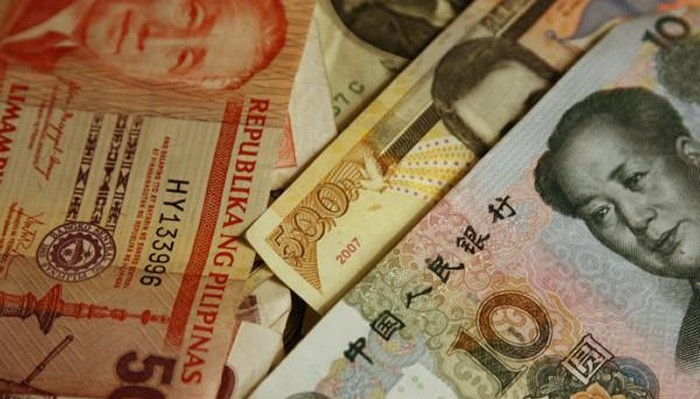
RAMSAY STAYS IN ASIA
Ramsay Health Care has terminated the possible sale of its Ramsay Sime Darby Health Care joint venture in Asia to IHH Healthcare Berhad after negotiations that had valued the group at $US1.35 billion ($1.83 billion).
Ramsay entered Asia about 18 years ago and hoped to create a larger healthcare group, but that has not occurred given the high prices of assets in the region. In February, Sime Darby said its initial public offering plan for the joint venture with Ramsay, which has hospitals in Malaysia and Indonesia, would not go ahead.
The sale would have been a setback for the Australian government’s effort to make Australian health care capabilities a key part of the efforts to increase Australian investment in the region. The planned regional exit announced in March was quickly overshadowed by a bid for the Australian parent company in September from the private equity firm KKR. But that transaction has also been abandoned.
INDONESIAN INVESTMENT
Indonesia’s top government investment executive has welcomed a visit to the country in August by large superannuation funds, saying the trip has breathed new life into the bilateral economic relationship and business ties.
Indonesian Investment Authority chief executive Ridha Wirakusumah told The Australian the agency viewed Australia as a “strategically important partner”, and was optimistic about growing the relationship.
He said Prime Minister Anthony Albanese’s visit in June which led to the superannuation delegation had underscored the “significant opportunity for increased bilateral relations between Australia and Indonesia, especially through co-investment. I believe the visit has refreshed and reinvigorated relationships between Australia and Indonesia, especially in the area of commerce and investments.”
“We will have to see how our discussions further develop but we believe we are on the right track. It may be time for Australian fund managers to consider Indonesia as an investment destination country and to potentially partner with INA. As close neighbours with long historical relations, we are looking forward to involving more Australian partners to be a part of Indonesia’s sustainable development,” he said.
Indonesia is emerging from the pandemic stronger than many developing economies with strong domestically driven growth and relatively low debt, and is trying to use this status in a new push to attract foreign investment.
CHINESE IRON ORE
China’s biggest state-owned steelmaker plans to invest more than a billion dollars in a new Australian iron ore mine in a sign that diplomatic tensions between the two countries are not a total block to expanded business links.
The decision by Baowu to invest in Rio Tinto’s $2.96 billion Western Range iron ore mine with a 46 per cent stake came after the company also backed mining entrepreneur Chris Ellison’s plan to build a new iron ore mining area in the West Pilbara region of Western Australia.
In a contrast to the diplomatic relationship, Baowu Resources Chairman Shi Bing described its long relationship with Rio as a “win-win” which had built “friendship and trust” and it wanted to expand into more fields with the company.
Baowu is Rio’s biggest customer globally after a working relationship extending back for more than four decades when bilateral commercial relations began during the Hawke government.
DIPLOMATICALLY SPEAKING
China is willing to work with Russia to play a leading role in demonstrating the responsibility of major powers, and to instil stability and positive energy into a world in turmoil.
- Chinese President Xi Jinping at the Shanghai Cooperation Organisation summit September 15
We highly appreciate the balanced position of our Chinese friends in connection with the Ukrainian crisis. We understand your questions and concerns in this regard. During today's meeting, of course, we will explain in detail our position on this issue.
- Russian President Vladimir Putin
I know that today’s era is not of war and we have talked to you many times over the phone on the subject that democracy and diplomacy and dialogue are all these things that touch the world … We will definitely get a chance to discuss how we can move onto the path of peace in the coming days, I will also get an opportunity to understand your point of view.
- Indian Prime Minister Narendra Modi at the SCO summit
I know about your position on the conflict in Ukraine and I know about your concerns. We want all of this to end as soon as possible.
- Putin
DATAWATCH
HOME MADE GROWTH
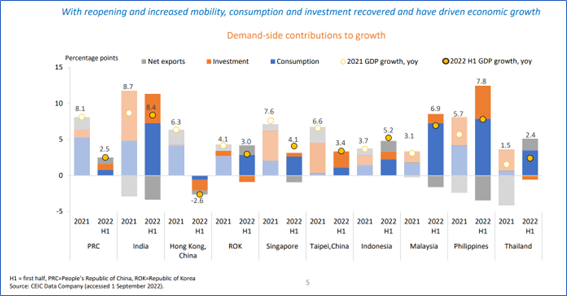
Source: Asian Development Bank economic outlook update
The Asian Development Bank has cut its outlook for economic growth in developing Asia this year from 5.2 per cent to 4.3 per cent amid growing global challenges from the Ukraine war to higher interest rates. But the report highlights how rising domestic demand as most developing economies reopen from the pandemic along with an increased role for services in these economies has underpinned growth. Next year’s forecast growth has been cut from 5.3 per cent to 4.9 per cent.
ON THE HORIZON
GREEN MATES
Singapore Prime Minister Lee Hsien Loong is set to visit Australia in October to sign a long discussed “green economy” agreement which will smooth the way for more climate-friendly financing and technology development.
The visit on October 16-18 for the seventh annual dialogue between the countries’ leaders follows several initiatives to move beyond the bilateral free trade agreement to deeper economic integration including people movement, recognition of standards and supply chains. Lee will also attend a business lunch hosted by the Asia Society Australia in Sydney.
The discussions will provide a useful grounding for Albanese on regional issues before he embarks on the regional season of summits in November with the East Asia Summit in Cambodia, the Group of 20 leaders’ meeting in Bali, and the Asia Pacific Economic Cooperation group summit in Thailand.
- And don’t miss our online persona Asia Briefing LIVE on October 19-20 for taking the pulse of a complex Asia and Australia’s relationships in the region - in partnership with Bloomberg.
ABOUT BRIEFING MONTHLY
Briefing MONTHLY is a public update with news and original analysis on Asia and Australia-Asia relations. As Australia debates its future in Asia, and the Australian media footprint in Asia continues to shrink, it is an opportune time to offer Australians at the forefront of Australia’s engagement with Asia a professionally edited, succinct and authoritative curation of the most relevant content on Asia and Australia-Asia relations. Focused on business, geopolitics, education and culture, Briefing MONTHLY is distinctly Australian and internationalist, highlighting trends, deals, visits, stories and events in our region that matter.
We are grateful to the Judith Neilson Institute for Journalism and Ideas for its support of Briefing MONTHLY and its editorial team.
Partner with us to help Briefing MONTHLY grow. For more information please contact [email protected]

This initiative is supported by the Judith Neilson Institute for Journalism and Ideas.


